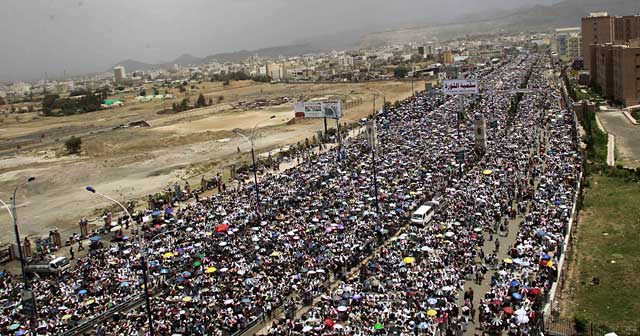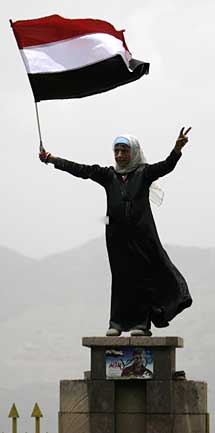The tribal leader Sadeq Abdullah al-Ahmar said Friday it agreed to a truce with security forces in Yemen after four days of clashes in Sanaa, the capital of Saudi Arabia. "Since last night, there is a cessation of hostilities between us and the forces of President Ali Abdullah Saleh. It also conducts a mediation," said Sheikh, one of the main leaders of the forces opposing the regime.
But several analysts say the truce is more theoretical than practical. Militias loyal to Al Ahmar came to occupy several ministries and forced the closure of the airport of the capital. Friday claimed to have taken control of a military complex near Sanaa, while increasing fighting is plunging the country into a civil war in the last four days have recorded the deaths of at least 100 people.
Yemeni planes flew over the capital Friday, the scene of clashes between forces loyal to Saleh and the Hashed tribe, led by Al Ahmar and close to the opposition Islamist Islah party. There were also clashes in two other military bases. In Sanaa, tens of thousands of people gathered after Friday prayers for what they called a 'Friday Peaceful Revolution' against Saleh, releasing white doves and crates carrying about 30 people killed in clashes this week.
But the call, inspired by the revolutions in Egypt and Tunisia, was lower than in previous weeks, as many people fled the capital for fear of confrontations. Fighting between government forces and the Hashed tribe is the bloodiest since the protests began last January. Analysts fear that Yemen, which is already on the brink of financial collapse, becoming a failed state.
United States and Saudi Arabia fear that an extension of anarchy in the Arab country could give more ground to al Qaeda to operate. In Geneva, the Human Rights Commission of the UN said that the dangerous escalation of violence in Yemen is extremely alarming, especially when the government and the opposition were so close to an agreement for the transition of power, but ultimately not did sign the agreement announced, which included the ouster of Saleh and judicial immunity for the president. 


But several analysts say the truce is more theoretical than practical. Militias loyal to Al Ahmar came to occupy several ministries and forced the closure of the airport of the capital. Friday claimed to have taken control of a military complex near Sanaa, while increasing fighting is plunging the country into a civil war in the last four days have recorded the deaths of at least 100 people.
Yemeni planes flew over the capital Friday, the scene of clashes between forces loyal to Saleh and the Hashed tribe, led by Al Ahmar and close to the opposition Islamist Islah party. There were also clashes in two other military bases. In Sanaa, tens of thousands of people gathered after Friday prayers for what they called a 'Friday Peaceful Revolution' against Saleh, releasing white doves and crates carrying about 30 people killed in clashes this week.
But the call, inspired by the revolutions in Egypt and Tunisia, was lower than in previous weeks, as many people fled the capital for fear of confrontations. Fighting between government forces and the Hashed tribe is the bloodiest since the protests began last January. Analysts fear that Yemen, which is already on the brink of financial collapse, becoming a failed state.
United States and Saudi Arabia fear that an extension of anarchy in the Arab country could give more ground to al Qaeda to operate. In Geneva, the Human Rights Commission of the UN said that the dangerous escalation of violence in Yemen is extremely alarming, especially when the government and the opposition were so close to an agreement for the transition of power, but ultimately not did sign the agreement announced, which included the ouster of Saleh and judicial immunity for the president.



No comments:
Post a Comment